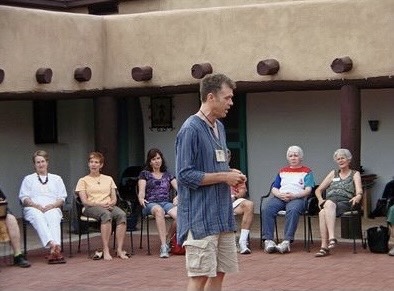
a retreat house at Ghost Ranch, NM
Among the many things that I’ve done for the congregation (with or without choir) are a few that have worked well. A couple of them also appear in the “Mixed Voices” catalog.
Eat This Bread for 2-4 parts in canon with keyboard and/or guitar
A slightly modified version of the traditional fraction anthem. Sings easily in unison or canon and includes full score as well as congregational insert.
Gloria Patri Canon for any combination of voices and organ or piano
The traditional text set in canon with a syncopated, thundering organ part. Comes with the full score and congregational part to put in the bulletin.
Gospel Communion for choir or congregation and piano
The “Holy, Holy” (Sanctus) has been very popular and is included in the Presbyterian hymnal, GLORY TO GOD. Its gospel-style setting is adapted for the Memorial Acclamation and Amen, making the entire service easy to learn and irresistible to sing. Comes with the full score and bulletin-sized congregational parts.
How I Love Your Ways, O Lord for unison choir or cantor, congregation, and keyboard
A setting of Psalm 119 (in paraphrase) to the lilting Irish tune THE LARK IN THE CLEAR AIR. Includes a congregational part for inclusion in the bulletin.
Into your Hands, Lord for SATB, congregation and piano
A short response in a blues style for use during Lent and Holy Week. Comes with a congregational part for inclusion in the bulletin.
Love Is Patient for SATB, congregation, cantor and guitar
Based on the the passage from Corinthians, this piece works well as a response to the Gospel, a response to pardon, or simply as a meditation appropriate to communion or other times. Comes with the congregational part for inclusion in the bulletin.
Rise Up, Shepherd, and Follow for unison voices and piano
A gospel-type accompaniment (though not too difficult) gives a spicier flavor to this traditional Christmas favorite. The vocal line works for a soloist, choir or congregation.
With the Ebb and the Flow for unison voices (opt. descant) and piano
An alternative Doxology (free of gender-based language) with text from the Carmina Gaedelica and a hammered dulcimer-like accompaniment.